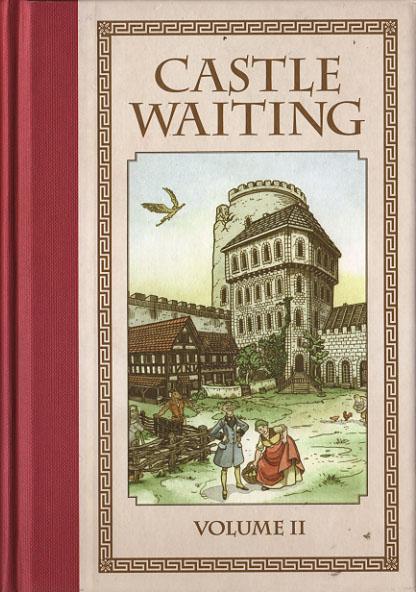Castle Waiting II
Reviewed by Jonathan Bogart 18-Jan-11
A beautifully-drawn, gently funny, and thoroughly, fiercely feminist fable of identity and community.
Linda Medley’s website has not been updated since 2008. Apparently she demanded that her name be taken off the most recent collection of Castle Waiting, the most original and engaging fantasy comic since Bone. Internet scuttlebutt has it that this is her second personal falling-out with a publisher (the first was Jeff Smith’s Cartoon Books), the usual message-board subtext being what else can you expect from those flighty, emotional creatures, women.
All of which is an unwelcome distraction from the actual material. If this second volume was published without her total consent, whether to fulfill the letter of a two-book deal or out of sheer relationship-ending spite (speculation is the primary conversational currency of comics fandom), it’s still a beautifully-drawn, gently funny, and thoroughly, fiercely feminist fable of identity and community.
The first volume of Castle Waiting, published back in 2006, was a thick slab of lovingly detailed imagination, introducing us to a post-fairytale world in which stork-headed men, bearded nuns, giant children, and capitalist princesses with secrets to keep all get along remarkably well. It’s a cozy, domestic world Medley has created, less interested in High Adventure or Ominous Perils than in the day-to-day of dealing with pests, investigating personal histories, and finding comedy in lived moments rather than convoluted situations or jokey dialogue.
I’m not sure why Internet feminists haven’t embraced Medley’s work more deeply — maybe they just don’t know about it? maybe comics are still a difficult sell to serious intellectuals? maybe the boys’ club mentality of comics culture has done its damndest to drive off anyone with both a vagina and a brain? COULD BE — but anyone wanting to give kids smart reading material that both engages their imaginations and gives the patriarchy a few knocks on the head could do a lot worse. Topics like gender fluidity, domestic abuse, and feminist critiques of religion, capitalism, and general Otherness are broached sensibly and without sermonizing; if Castle Waiting is at least in part a children’s series, it’s for the children of dedicated progressives intent on seeing the world free of ancient prejudices and modern rancors.
The second volume continues both the quiet humorousness and the tempered spirit of tolerance, as Medley’s characters explore their spaces, dig into personal histories, and in the most exciting sequence in the entire series to date, bowl ninepins. Medley is careful and methodical, sometimes agonizingly so, about expanding her world, with hints continually dropped about further reaches of politics, religion, interpersonal and interspecies relations, that it seems she’ll have material for decades to come if she chooses, but it’s the quiet moments of conversation, minor revelations, and growing in-jokes that stick.
On a personal level, I’m as enamored of the format in which Fantagraphics has published these volumes as I am of Medley’s content: thick hardcovers the size of an old novel, like the Andrew Lang collections of fairy tales that seem to have been one of Medley’s main inspirations. Even with the graphic novel boom of the past decade, it’s still unusual to see comics collections that are more than three hundred pages long, but Medley’s crisp, clear art and elegant layouts is perfectly suited to the size. If I ever made comics that were worth preserving, this is how I would want them collected.
There are a couple of aesthetic niggles I have with the books — Todd Klein’s lettering in the first volume is too regular and programmatic, and when Medley switches to a font in the second volume it’s even worse. (I freely acknowledge being a crank on the subject of handlettering, but I’ll never understand why people who take such evident care with the rest of their visual worlds are content to let the words look like an office memo from 1998.) And as comfortable and homey as the dialogue is, it’s less distinctive than the art: Medley doesn’t even attempt to play with language the way she plays with visuals and identity.
The only public statement I’ve seen made on the subject is that Medley is taking a break from Castle Waiting. Whether she’s also taking a break from Fantagraphics remains unsaid; selfishly, I hope not, because the books are so beautiful that I want all (any?) future volumes to match them in production values, but even more I hope Medley does what’s best for her and her intellectual property. Regardless of how it happens, I want Castle Waiting to continue in some fashion — or, failing that, that she does something else even better.
Tags: Castle Waiting, Fantagraphics, Linda Medley